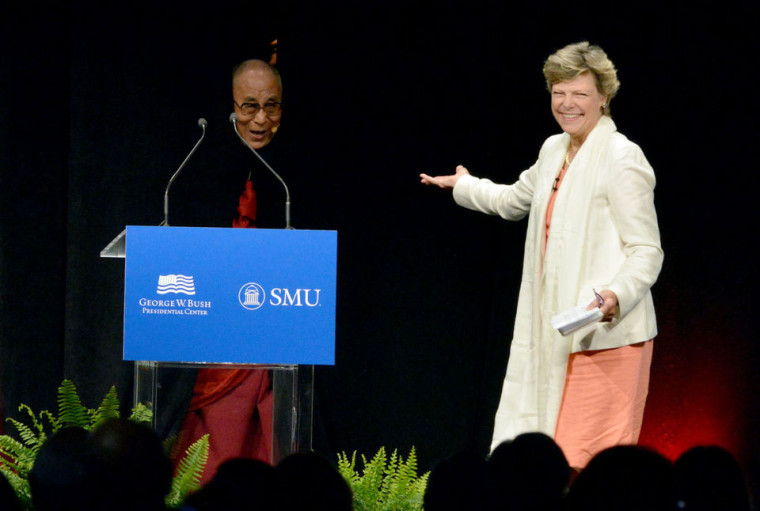His Holiness the Dalai Lama is a wonderful teacher. The same could be said for Pope Francis and many religious leaders. I had the privilege to hear the Dalai Lama during his visit to SMU’s campus. He shared his belief in humanity and the power of compassion and happiness. Of course, these are themes His Holiness frequently discusses. What struck me most throughout the event was the degree to which he obviously believes in teaching with humor. Despite the well-known benefits of teaching with humor, I believe we don’t do this enough in college teaching.

From the nearly the moment he took the stage to the end (pictured above), the Dalai Lama used humor to bring in and connect with the audience.
While no one would mistake his discussion for an evening at the Improv, he artfully took advantage of light hearted moments and jokes.
He liked to call things “silly” and possessed an infectious laugh. In particular, he leveraged his laugh holding it for a bit longer than necessary making the moment slightly awkward and completely endearing.
Whether arguing for peace or teaching an introductory seminar, teaching with humor offers tremendous benefits.
Public speakers frequently use a funny anecdote to get people’s attention. Laughing brings people together and even helps create focus.
In class, humor helps foster an open and inviting learning environment where students feel comfortable engaging.
Just as the Dalai Lama knew how to hold his laugh for a minute, faculty can and should be willing to put themselves out there. Hold the joke for a moment and don’t worry about being a little embarrassed. It can be part of the fun and endear you to students.
Teaching with humor can also bring enthusiasm to the classroom and show students how much you enjoy your subject.
I think many faculty try to be too serious or believe their material is too serious. If the Dalai Lama can discuss freedom, conflict, and humanity using humor, surely we can do the same with an undergraduate class.
While laughter can bring a class together or help share enthusiasm, the most significant benefit is that humor improves student learning.
Research on student learning shows that humor activates more of the brain than sitting listening to a conversation or lecture. Laughing and humor maximizes learning and memories helping students learn and retain course material.
Finally, humor can help bring a subject to life for students or reinforce a particularly significant point in class. I often use a joke or funny line to help students remember the point I’m trying to stress to them.
In fact, I frequently find humor as one of the more important and effective tools at my disposal when teaching. I strongly believe in the necessity of keeping students engaged and have found humor to be useful in fostering engagement.
I hope the next time you’re teaching a class or a workshop where you are trying to engage students and help their learning that you’ll take a page from the Dalai Lama. Joke, be silly, and hold your laugh for a little longer than you should.
Your students will learn more. And both you and the class will be happier.
As the Dalai Lama has said, “Happiness is not something ready made. It comes from your own actions.”

